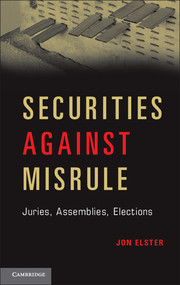Book contents
- Frontmatter
- Contents
- Preface and Acknowledgments
- Introduction
- 1 The Normative Study of Collective Decision Making
- 2 Ignorance, Secrecy, and Publicity in Jury Decision Making
- 3 A Dialogue with Bentham
- 4 The Optimal Design of Constituent Assemblies
- 5 Cross-Voting: A Study in Failure
- Conclusion
- References
- Index
- References
2 - Ignorance, Secrecy, and Publicity in Jury Decision Making
Published online by Cambridge University Press: 05 March 2013
- Frontmatter
- Contents
- Preface and Acknowledgments
- Introduction
- 1 The Normative Study of Collective Decision Making
- 2 Ignorance, Secrecy, and Publicity in Jury Decision Making
- 3 A Dialogue with Bentham
- 4 The Optimal Design of Constituent Assemblies
- 5 Cross-Voting: A Study in Failure
- Conclusion
- References
- Index
- References
Summary
INTRODUCTION
The institution of the jury displays in a uniquely focused way many of the problems and challenges of collective decision making in general. Because of the complexity and richness of the institution and its history, I shall mainly discuss one particular aspect: secrecy versus publicity in jury decision making. Actually, as we shall see, some of the choices can more accurately be cast in terms of ignorance versus knowledge.
The jury is an institution of great antiquity. The Athenians used juries to decide legal as well as some political issues. Some Roman courts also relied on jurors. I shall occasionally refer to these institutions. The jury then seems to have disappeared from Western Europe until its reemergence in England around 1200. Although I shall mostly discuss contemporary jury systems in Great Britain, the United States, and a few other countries, I shall also cite some cases and debates from earlier periods. I shall pay particular attention to what one might call the rise and fall of the French jury between 1789 and 1941.
Jurors are laypersons, often chosen at random, and today usually on a one-off basis. Judges are professional “repeat agents.” When, as is the case in many countries, jurors are supplemented by judges, the dynamics of deliberation change. In that case, the jurors cannot reserve their opinions for other jurors but must share them with the judges. In this (somewhat special) sense, these augmented courts reduce the secrecy of jury deliberations. I do not here have in mind the “mixed jury” that is used in Germany and other countries, where a few lay judges serve together with one or several professional judges. Rather, I have in mind cases in which a full jury is supplemented by one or a few professional judges.
- Type
- Chapter
- Information
- Securities against MisruleJuries, Assemblies, Elections, pp. 98 - 139Publisher: Cambridge University PressPrint publication year: 2013



